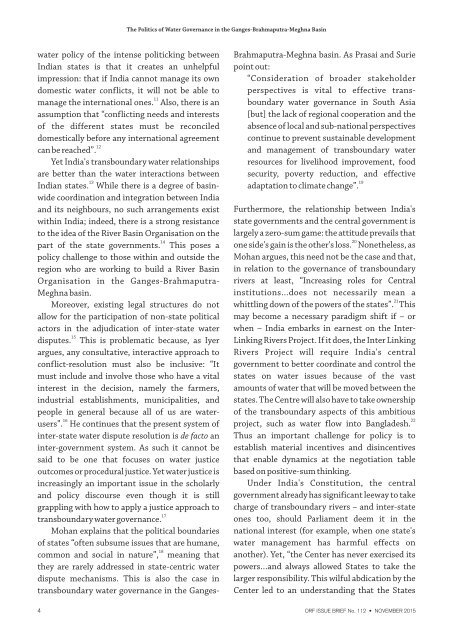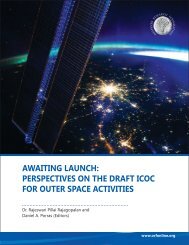The Politics of Water Governance in the Ganges-Brahmaputra-Meghna Basin
Xx6Bje
Xx6Bje
You also want an ePaper? Increase the reach of your titles
YUMPU automatically turns print PDFs into web optimized ePapers that Google loves.
<strong>The</strong> <strong>Politics</strong> <strong>of</strong> <strong>Water</strong> <strong>Governance</strong> <strong>in</strong> <strong>the</strong> <strong>Ganges</strong>-<strong>Brahmaputra</strong>-<strong>Meghna</strong> Bas<strong>in</strong><br />
water policy <strong>of</strong> <strong>the</strong> <strong>in</strong>tense politick<strong>in</strong>g between<br />
Indian states is that it creates an unhelpful<br />
impression: that if India cannot manage its own<br />
domestic water conflicts, it will not be able to<br />
11<br />
manage <strong>the</strong> <strong>in</strong>ternational ones. Also, <strong>the</strong>re is an<br />
assumption that conflict<strong>in</strong>g needs and <strong>in</strong>terests<br />
<strong>of</strong> <strong>the</strong> different states must be reconciled<br />
domestically before any <strong>in</strong>ternational agreement<br />
12<br />
can be reached .<br />
Yet India's transboundary water relationships<br />
are better than <strong>the</strong> water <strong>in</strong>teractions between<br />
13<br />
Indian states. While <strong>the</strong>re is a degree <strong>of</strong> bas<strong>in</strong>wide<br />
coord<strong>in</strong>ation and <strong>in</strong>tegration between India<br />
and its neighbours, no such arrangements exist<br />
with<strong>in</strong> India; <strong>in</strong>deed, <strong>the</strong>re is a strong resistance<br />
to <strong>the</strong> idea <strong>of</strong> <strong>the</strong> River Bas<strong>in</strong> Organisation on <strong>the</strong><br />
14<br />
part <strong>of</strong> <strong>the</strong> state governments. This poses a<br />
policy challenge to those with<strong>in</strong> and outside <strong>the</strong><br />
region who are work<strong>in</strong>g to build a River Bas<strong>in</strong><br />
Organisation <strong>in</strong> <strong>the</strong> <strong>Ganges</strong>-<strong>Brahmaputra</strong>-<br />
<strong>Meghna</strong> bas<strong>in</strong>.<br />
Moreover, exist<strong>in</strong>g legal structures do not<br />
allow for <strong>the</strong> participation <strong>of</strong> non-state political<br />
actors <strong>in</strong> <strong>the</strong> adjudication <strong>of</strong> <strong>in</strong>ter-state water<br />
15<br />
disputes. This is problematic because, as Iyer<br />
argues, any consultative, <strong>in</strong>teractive approach to<br />
conflict-resolution must also be <strong>in</strong>clusive: It<br />
must <strong>in</strong>clude and <strong>in</strong>volve those who have a vital<br />
<strong>in</strong>terest <strong>in</strong> <strong>the</strong> decision, namely <strong>the</strong> farmers,<br />
<strong>in</strong>dustrial establishments, municipalities, and<br />
people <strong>in</strong> general because all <strong>of</strong> us are water-<br />
16<br />
users . He cont<strong>in</strong>ues that <strong>the</strong> present system <strong>of</strong><br />
<strong>in</strong>ter-state water dispute resolution is de facto an<br />
<strong>in</strong>ter-government system. As such it cannot be<br />
said to be one that focuses on water justice<br />
outcomes or procedural justice. Yet water justice is<br />
<strong>in</strong>creas<strong>in</strong>gly an important issue <strong>in</strong> <strong>the</strong> scholarly<br />
and policy discourse even though it is still<br />
grappl<strong>in</strong>g with how to apply a justice approach to<br />
17<br />
transboundary water governance.<br />
Mohan expla<strong>in</strong>s that <strong>the</strong> political boundaries<br />
<strong>of</strong> states <strong>of</strong>ten subsume issues that are humane,<br />
18<br />
common and social <strong>in</strong> nature , mean<strong>in</strong>g that<br />
<strong>the</strong>y are rarely addressed <strong>in</strong> state-centric water<br />
dispute mechanisms. This is also <strong>the</strong> case <strong>in</strong><br />
transboundary water governance <strong>in</strong> <strong>the</strong> <strong>Ganges</strong>-<br />
<strong>Brahmaputra</strong>-<strong>Meghna</strong> bas<strong>in</strong>. As Prasai and Surie<br />
po<strong>in</strong>t out:<br />
Consideration <strong>of</strong> broader stakeholder<br />
perspectives is vital to effective transboundary<br />
water governance <strong>in</strong> South Asia<br />
[but] <strong>the</strong> lack <strong>of</strong> regional cooperation and <strong>the</strong><br />
absence <strong>of</strong> local and sub-national perspectives<br />
cont<strong>in</strong>ue to prevent susta<strong>in</strong>able development<br />
and management <strong>of</strong> transboundary water<br />
resources for livelihood improvement, food<br />
security, poverty reduction, and effective<br />
19<br />
adaptation to climate change .<br />
Fur<strong>the</strong>rmore, <strong>the</strong> relationship between India's<br />
state governments and <strong>the</strong> central government is<br />
largely a zero-sum game: <strong>the</strong> attitude prevails that<br />
20<br />
one side's ga<strong>in</strong> is <strong>the</strong> o<strong>the</strong>r's loss. None<strong>the</strong>less, as<br />
Mohan argues, this need not be <strong>the</strong> case and that,<br />
<strong>in</strong> relation to <strong>the</strong> governance <strong>of</strong> transboundary<br />
rivers at least, Increas<strong>in</strong>g roles for Central<br />
<strong>in</strong>stitutions does not necessarily mean a<br />
21<br />
whittl<strong>in</strong>g down <strong>of</strong> <strong>the</strong> powers <strong>of</strong> <strong>the</strong> states . This<br />
may become a necessary paradigm shift if or<br />
when India embarks <strong>in</strong> earnest on <strong>the</strong> Inter-<br />
L<strong>in</strong>k<strong>in</strong>g Rivers Project. If it does, <strong>the</strong> Inter L<strong>in</strong>k<strong>in</strong>g<br />
Rivers Project will require India's central<br />
government to better coord<strong>in</strong>ate and control <strong>the</strong><br />
states on water issues because <strong>of</strong> <strong>the</strong> vast<br />
amounts <strong>of</strong> water that will be moved between <strong>the</strong><br />
states. <strong>The</strong> Centre will also have to take ownership<br />
<strong>of</strong> <strong>the</strong> transboundary aspects <strong>of</strong> this ambitious<br />
22<br />
project, such as water flow <strong>in</strong>to Bangladesh.<br />
Thus an important challenge for policy is to<br />
establish material <strong>in</strong>centives and dis<strong>in</strong>centives<br />
that enable dynamics at <strong>the</strong> negotiation table<br />
based on positive-sum th<strong>in</strong>k<strong>in</strong>g.<br />
Under India's Constitution, <strong>the</strong> central<br />
government already has significant leeway to take<br />
charge <strong>of</strong> transboundary rivers and <strong>in</strong>ter-state<br />
ones too, should Parliament deem it <strong>in</strong> <strong>the</strong><br />
national <strong>in</strong>terest (for example, when one state's<br />
water management has harmful effects on<br />
ano<strong>the</strong>r). Yet, <strong>the</strong> Center has never exercised its<br />
powers and always allowed States to take <strong>the</strong><br />
larger responsibility. This wilful abdication by <strong>the</strong><br />
Center led to an understand<strong>in</strong>g that <strong>the</strong> States<br />
4 ORF ISSUE BRIEF No. 112 • NOVEMBER 2015








